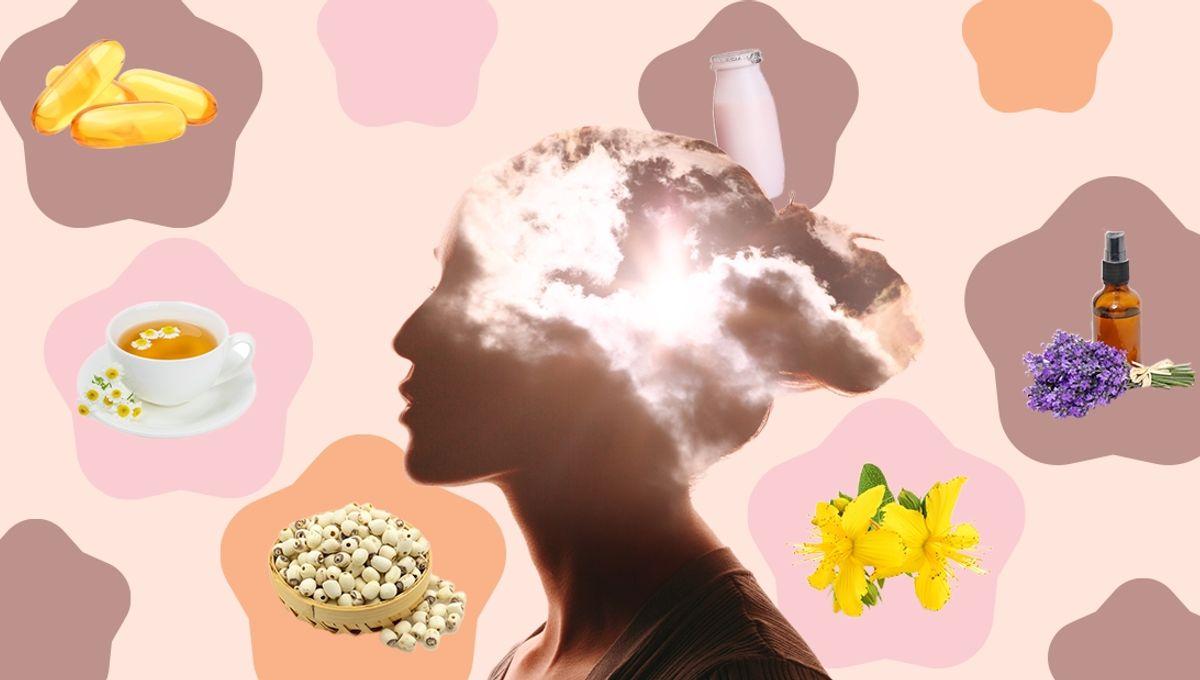What do zinc, bitter orange, lavender, saffron, and vitamin D all have in common? No, they’re not the ingredients to a bizarre-sounding salad, but they are all products that have been touted as natural antidepressants. The real question is – do any of them actually work?
Natural antidepressants are pretty much what it says on the tin – dietary supplements and herbal products that some claim to be natural alternatives to standard treatments like synthetically produced antidepressants. You might have heard of some of them; one of the most well-known is St John’s wort, a flowering shrub that’s been packaged up into a variety of tablets and tinctures. There’s also omega-3s and vitamin D, supplements that are typically taken for purposes other than treating depression. But those three products are far from on their own. There are a whole bunch of different herbs and supplements out there that have been promoted to have antidepressant effects, ranging from the floral, like lavender, Rhodiola, and chamomile, to the metallic magnesium and zinc. Before we dive into whether or not natural antidepressants work, it’s first worth pointing out that dietary supplements and herbal medicine products are treated different by regulators – they aren’t FDA approved to treat or prevent any disease or condition, including depression. That means they haven’t been through the same rigorous level of testing and evaluation that is required of standard antidepressants, which means it’s difficult to know whether the product you’re picking from the shelf is safe, let alone effective. That’s not to say that no research has been done into the efficacy of natural antidepressants – quite the opposite, in fact. In a recent scoping review – a type of scientific study that gives an overview of what evidence is out there and identifies knowledge gaps, but doesn’t form a conclusion intended to guide clinical decision-making – researchers identified 209 trials that evaluated the use of dietary supplements and herbal medicines for depression. Some of the most frequently investigated products were St John’s wort, omega-3s, probiotics, vitamin D, and saffron. Still, the sheer number of trials doesn’t tell you whether or not something is effective – but if lots of studies find the same thing, then there’s a bit more of a case to be made. So, what did the team find out on the efficacy front? “Compared to placebo, fewer omega-3 trials found effects for depression than those that found no effects,” wrote the study’s first author, Rachael Frost, in an editorial discussing the findings. “However, St John’s Wort and saffron more often showed effects compared to placebo, and similar results to prescription antidepressants. Probiotics and vitamin D were more likely to reduce depressive symptoms than placebo.” But that’s far from conclusive; Frost and colleagues also point out in their study that there was “considerable variation in the specific products, extracts, and dosages tested” when it came to these particular products. That lack of standardization makes it difficult to convincingly pinpoint what exactly it is that seems to be effective. You can’t justifiably recommend a particular dose of a product, for example, without lots of other studies providing evidence that that exact same dose is effective. On that point, Frost and the team also identified multiple supplements and herbal medicines that had only had one trial investigating them – so although singular trials found positive effects for products like rosemary, basil, and lotus seeds compared to a placebo, without further research, those effects aren’t particularly compelling. The same goes for cases where products were found to be less effective, or showed no statistically significant effect compared to placebo or standard antidepressants, too. All of this is to say that, for many products claimed to be natural antidepressants, there’s still plenty of research that needs to be done before those claims can be properly held up. It’s not just efficacy that needs to be considered when it comes to natural antidepressants – safety is also paramount. The above analysis found few safety concerns with the dietary supplements and herbal medicines tested, even when they were taken alongside regular antidepressants (the safety concern here is that the two products could interact in a dangerous way). However, not all studies included carried out safety reporting to a high standard, so it’s hard to know for certain how truly safe they are. Drug interactions, for example, are still a possibility. For instance, St John’s wort can interfere with the action of multiple drugs, including blood thinners, contraceptives, and some immune suppressants. In cases where it’s taken alongside standard antidepressants, there’s still a risk of it causing too high a level of serotonin in the body, which can lead to a potentially life threatening condition called serotonin syndrome. It's also worth reiterating the lack of regulation when it comes to natural antidepressants. Without sufficient oversight, it can’t be guaranteed that the product contains what it says it does. Even if that turns out not to be the case, there’s still no certainty that you’re getting the exact dose, for example, that was evaluated in studies. Before taking any dietary supplement or herbal medicine – regardless of what it’s being taken for – it’s always worth speaking to a doctor about it first, particularly if someone is already taking other medicines, prescription or otherwise. All “explainer” articles are confirmed by fact checkers to be correct at time of publishing. Text, images, and links may be edited, removed, or added to at a later date to keep information current. The content of this article is not intended to be a substitute for professional medical advice, diagnosis, or treatment. Always seek the advice of qualified health providers with questions you may have regarding medical conditions. What are natural antidepressants?
Do natural antidepressants actually work?
Are natural antidepressants safe to use?




